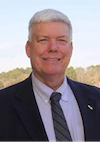Series Summary
The past two APS meetings, members of the Chemical Control and Industry committees have expressed the need for training regarding interpretation of pesticide labels and the proper use and importance of fungicides in agriculture. Labels provide valuable information regarding active ingredient, product formulation, application directions, crop usage, requirements for safety, acute toxicity to the environment, animals, and humans, and instructions for storage and disposal. The correct application of fungicides provides proper control of plant pathogens, delays resistance outbreaks, and extends the period that an at-risk fungicide is effective. Moreover, the proper interpretation of labels prevents incidents and contaminations of workers associated to exposure due to misusage. Therefore, the goal of this three-part webinar series is to inform the APS community about the processes for registration and labeling of fungicides, how to correctly interpret a fungicide label, how to properly use it for plant disease management, and how to effectively communicate the topic with stakeholders. Professionals from the EPA, USDA, industry, academia, and extension services will provide their expertise and experience regarding the subject in their respective areas.
Why is this Important?
Public concern about the risks related to pesticide usage in agriculture, such as pesticide residue in food, short- and long-term exposure of workers, and contamination of the environment has increased over the past years, especially with the advent of social media. Moreover, incorrect usage of fungicides leads to failure in disease control, which might contribute to increased number of applications and development of fungicide resistance. Nevertheless, not following label instructions is among the most common causes of pesticide incidents. Therefore, understanding the processes behind the registration and labeling of fungicides and how to properly interpret labels will help with a more correct and efficient usage of fungicides in agriculture, contributing to a sustainable food production. In addition, common incidents and contamination related to fungicide misuse and exposure could be avoided.
What Will Attendees Take Away?
- Understand the importance of using fungicides according to the label.
- Comprehend how to interpret synthetic fungicide labels.
- Learn how to effectively communicate the above takeaways with stakeholders.
Registration and Labeling of Conventional Fungicides
Broadcast Date: May 24, 2022
Time: 11:00 A.M.Central
View On-Demand Video
Webinar Summary
In this session, professionals from USDA and EPA will discuss the processes of labeling, registration and registration renewal of synthetic fungicides in the USA.
Presenter

Dr. Julius Fajardo
United States Department of Agriculture (USDA) |
Dr. Julius Fajardo is a Plant Pathologist at the USDA Office of Pest Management Policy in Washington D.C. Before joining the USDA in 2012, he took on the roles of R&D Manager, Technical Manager and Product Development Manager at Agriliance, Chemtura and Bayer CropScience, respectively. Dr. Fajardo has a Bachelor of Science in Agriculture and a Master of Science in Plant Pathology from the University of the Philippines at Los Banos and a Ph.D. in Plant Pathology from Texas A&M University. In his current role, he is responsible for policy issues involving registration reviews of fungicides, bio fungicides, nematicides, and plant growth regulators including fungicide resistance.
|

Shaja Joyner
United States Environmental Protection Agency
| Shaja Joyner is a graduate of North Carolina Agricultural and Technical State University, where she obtained her Bachelor of Science Degree in Earth & Environmental Science, with a concentration in Waste Management.
She began her career in the environmental sector by serving at the US EPA Office of Air Quality and Planning Standards, in Research Triangle Park, NC, and the Department of Energy, Savannah River Site in Aiken, South Carolina where she collected air pollution data from state and local agencies, and developed remediation plans for hazardous waste sites, respectively.
She later moved to the Washington D.C. metropolitan area and obtained a position as Research Assistant at ICF Kaiser, an environmental consulting firm and EPA contractor, in Fairfax Virginia. There she served as the lead liaison for EPA’s Energy Star Buildings, Residential Homes, and Methane programs in support of its mission to reduce greenhouse gases.
In 1999, Shaja transitioned to EPA where she began her career in the Office of Pesticide Programs (OPP) serving on both the Minor Use and Section 18 Teams. Shaja also went on to serve at the EPA Office of Water but, later returned to OPP where she eventually became Product Manager (PM) for the Fungicide Branch.
Today, Shaja has expanded her depth by overseeing both fungicide and herbicide products in her current role as PM 20 of the Fungicide and Herbicide branch, EPA Registration Division. There she has been responsible for the review process for several new active ingredients, including Fluopyram, Mandestrobin, Valifenalate, and Bixafen, in addition to numerous new products- and continues to grow in her knowledge of the pesticide industry and related technologies in support of commercial agriculture. Outside of EPA, Shaja enjoys interior decorating, entertaining, and exploring creative spaces for an outlet. She also enjoys traveling, playing the keyboard, and spending time with her family.
|
Nate Moller
United States Environmental Protection Agency
| |
Discovery, Development, and Proper Use of Fungicides
Broadcast Date: June 30, 2022
Time: 11:00 A.M.Central
View On-Demand Video
Webinar Summary
The importance of the proper use and the need for the development of novel synthetic fungicides will be explored by representatives from the chemical industry and academia.
Presenters

Dr. Gilberto Olaya
Syngenta Crop Protection
|
Dr. Gilberto Olaya is part of Syngenta Crop Protection’s active disease control group, where his expertise in fungicide resistance is fundamental to delivering on the company’s commitment to fungicide stewardship. Dr. Olaya started his career with Syngenta in 1997 when he joined legacy company Zeneca Agrochemicals at the Western Research Center in California as an R&D scientist. Prior to this, he was a postdoctoral scientist at Cornell University, where he also received his M.S. and Ph.D. degrees in Plant Pathology. Olaya has played an active role in the American Phytopathological Society (APS), serving in various volunteer roles. He has been a member of the Pathogen Resistance committee since its formation, has chaired the committee, and organized several symposia and workshops on fungicide resistance. |

Dr. Megan Dewdney
University of Florida
|
Dr. Megan Dewdney is an associate professor in Plant Pathology and extension specialist at the University of Florida (UF), Citrus Research and Education Center. She has an M.Sc. in Plant Sciences, specializing in Plant Pathology at McGill University in Montreal, Quebec, Canada, and a PhD in Plant Pathology from Cornell University. At UF, Dewdney developed a program in citrus pathology with an emphasis on foliar fungal pathogens and huanglongbing (HLB). Although her program started with HLB, she was called to concentrate on etiology, epidemiology, and management of fungal diseases and on the development of fungicide resistance. Dewdney’s projects have led to the publication of research papers and several extension publications as part of her large citrus pathology extension program. |
Interpreting Fungicide Labels & Communication with Farmers & Extension Agents
Broadcast Date: June 14, 2022
Time: 11:00 A.M.Central
View On-Demand Video
Webinar Summary
Effective communication with stakeholders regarding correct interpretation of labels and practice when handling and exposed to synthetic fungicides will be discussed by extension experts.
Presenter

Dr. Robert Kemerait Jr.
University of Georgia, Tifton |
Dr. Robert Kemerait Jr. is a professor in the department of Plant Pathology at The University of Georgia – Tifton campus. He has a BS in Biology and Chemistry from Davidson College and The University of Florida (UF), respectively, and a Ph.D. in Plant Pathology from UF. Kemerait’s extension and research program focuses on providing timely, research-based recommendations to growers, extension agents and consultants for the management of soybean, peanut and cotton diseases. In addition to his extension activities, Kemerait devotes a significant portion of his program to applied research on a wide range of pathogens and pests affecting the crops above. He is heavily involved in national and international collaborations, including the Peanut Collaborative Research and Support Program that is funded by the USDA. |
